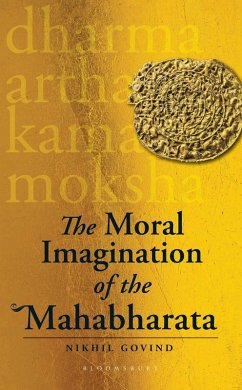The Mahabharata, one of the most popular epics, has had a remarkable impact on literary and cultural thought in India through the centuries. It is also of immense religious and philosophical importance and is considered itihasa, literally 'that which happened', or sacred history. Though the setting of the Mahabharata is distant in time, something of its indefatigable, insistent formulation of the pivotal dilemmas of our shared human moral imagination remains insistent and inextinguishable even today.
The Moral Imagination of the Mahabharata closely reads the conceptual and narrative intricacies of the epic through the four foundational terms of dharma (law), artha (worldliness), kama (desire) and moksha (freedom), offering riveting insights on the moral psychology of Indic civilization. Drawing from scholarly forays in philology, history, religious studies and pre-modern Asian traditions, this critical attention by a literary scholar to the Mahabharata's narrative impulses and the internal vigour of select episodes brings to fore the gripping dilemmas that animate the epic.
The book travels through an atmospheric and exuberant pre-modern milieu to provoke prescient metaphysical and ethical questions that are only accumulating in relevance in the contemporary world.
The Moral Imagination of the Mahabharata closely reads the conceptual and narrative intricacies of the epic through the four foundational terms of dharma (law), artha (worldliness), kama (desire) and moksha (freedom), offering riveting insights on the moral psychology of Indic civilization. Drawing from scholarly forays in philology, history, religious studies and pre-modern Asian traditions, this critical attention by a literary scholar to the Mahabharata's narrative impulses and the internal vigour of select episodes brings to fore the gripping dilemmas that animate the epic.
The book travels through an atmospheric and exuberant pre-modern milieu to provoke prescient metaphysical and ethical questions that are only accumulating in relevance in the contemporary world.


